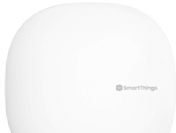Hearing loss can have a significant effect on a person’s quality of life, regardless of whether it’s caused by age, prolonged exposure to loud music or job-related noises, an accident or heredity.  In addition to missing out on all or parts of conversations, people with hearing loss often discover that they’re not hearing their doorbell or phone ringing or they’re not waking up on time because they don’t hear their alarm clock. An even bigger (and potentially fatal) risk is if they can’t hear the smoke or carbon monoxide detector alarming!
Fortunately, there are a range of notification systems and signalers to alert people with hearing loss of important everyday sounds like telephones and doorbells and allow them to live and function normally at home or when traveling.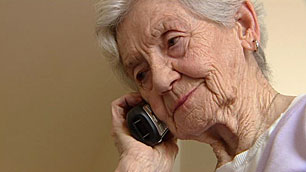
Hearing Loss Notification Systems Eliminate Everyday Inconveniences
Hearing loss need not interfere with a person’s daily life. The signaling devices and notification (or “alertingâ€) systems on the market today use extra loud alarms, flashing or strobing lights, and/or vibrating “shakers†to get the attention of hard of hearing users. And, unlike hearing aids, none of these devices require a visit to a doctor or need to be setup by a professional, making them an easy and effective solution to the inconvenience of hearing loss.
Here are some of the most popular signaling and notification devices. Note that you can choose signaling devices that work independently (listed in the first four sections) or notification systems (listed in the last section) which come with a receiver and various transmitters, some or which can be expanded by adding optional transmitters to detect and alarm for different conditions.
Doorbell Alerting Devices
- Strobe and Sound Signaler – The Nutone Wireless Doorbell notifies users when someone is at the door using both a flashing strobe signaler and audible chime. Plugs into any wall outlet and has a range of up to 100 feet.
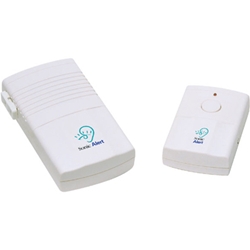
- Flashing Lamp Signalers – The Sonic Alert Universal Sound Signaler flashes the lamp of your choice to alert users of ringing doorbells as well as any other important sounds, including telephones,a  kitchen timer, babies crying, etc. The Sonic Alert Wireless Doorbell Signaler/Transmitter installs in minutes and includes a doorbell transmitter. It flashes any lamp you plug into its receiver but also chimes to notify the hearing members of the family.
Telephone Signalers
- Landline Phone Signaler – The Telestrobe Telephone Ring Signaler flashes a bright strobe when a landline telephone rings. In addition to flashing a bright LED light, the Dakota Alert Telephone Signaler also features an extra loud ringer. It has two settings up to 95 dB.
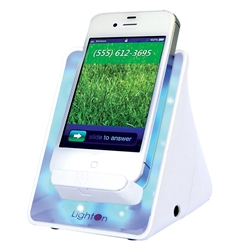
- Mobile Phone Flashing Signaler – The Dreamzon LightOn is a cradle that holds your mobile phone. Set your phone to “vibrate†and when a text message or call comes in, the LightOn unit will sense the vibration and flash a bright LED light to alert the user of a new message or call. (This device is great for mobile phone users with normal hearing too!)
Vibrating Alarm Clock
- Super Loud + Vibrating + Flashing Alarm Clock — The Bellman Vibrating Alarm Clock Classic wakes hard of hearing users with a powerful bedshaker, high-intensity LED lights and a built-in audible alarm that increases in sound volume.
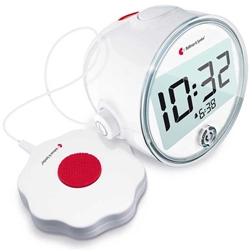
Fire/Smoke Alarms
- Vibrating Fire/Smoke Clock – Protect loved ones with hearing loss while they sleep with a Lifetone HL Bedside Fire Alarm and Clock that detects T3 sound patterns from existing smoke alarms in the home and wakes up users with a vibrating bedshaker and a low frequency, 520Hz audible sound.
- The Gentex 7139CS Hard Wired T3 Smoke Alarm with Backup Battery is an example of T3 Smoke Alarm unit that is compatible with the Lifetone HL Bedside Fire Alarm and Clock.  The other T3 smoke alarm models listed on this page are also compatible.
Notifications and Signaling Systems
- Doorbell + Telephone Strobe Kit – The Silent Call Sidekick 3 notification system plugs into a wall outlet and features a flashing strobe light and a display with indicator lights to notify hard of hearing users when the doorbell or telephone ring.

- Portable and Expandable System with Screen — The Central Alert Notification System by Serene Innovations starts with a CA-RX Remote Receiver. The receiver has a screen with big, easy-to-see alerting icons and uses an adjustable loud sound and bright flasher to alert users of various events in the house. Add up to 10 different transmitters to be alerted of household activities including door knocking, doorbells ringing, smoke/fire/CO2 alarms, crying babies and weather emergencies.
Great for the “In Denial†Hard of Hearing!
Many people lament that they have a family member or friend who suffers from hearing loss but won’t admit to it.  Well, it turns out that being in denial of having a hearing loss is pretty common, so says the Mayo Clinic . They report that most people affected by hearing loss live with the problem for years before seeking treatment — and many never seek treatment at all.
The signaling devices and notification systems mentioned in this article will help people with some degree of hearing loss (including those in denial!). In fact, even people with normal hearing can benefit by having extra loud ringers and flashing lights to notify them of important events in their home.




